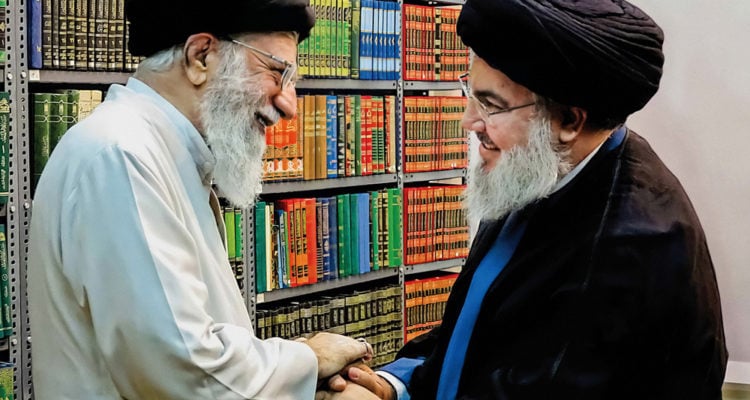Tehran’s desire now to preserve its assets and return the focus to the campaigns of attrition it prefers will have been well noted by both friend and foe.
By Johnathan Spyer, Middle East Forum
Hezbollah’s response to the killing of senior official Fuad Shukr, when it finally came, was a more minor event than anticipated.
For weeks, both the Lebanese Shia Islamist group and its Iranian patron have been threatening a terrible revenge for the recent assassinations in Beirut and Tehran.
It is now clear, however, that neither Hezbollah or Iran wishes to risk a descent to all out war at the present time.
Iran appears to have relegated its response to the killing of Hamas leader Ismail Haniyeh in Tehran to some point in the future.
Hezbollah, meanwhile, sought to target two sites of high significance – the Mossad headquarters, and the HQ of the IDF’s signals intelligence unit, 8200.
Both are located close to Herzliya, north of Tel Aviv, in central Israel. In the event, Hezbollah failed to strike either target.
Some 230 rockets and 20 drones were fired at Israel’s north.
There was some damage to houses, and one Israeli sailor was killed, apparently by debris from an interceptor.
Simultaneously, 100 Israeli jets struck at Hezbollah rocket launchers in southern Lebanon.
Six Hezbollah fighters were killed in the course of the day’s exchanges of fire.
In a speech given in the evening, Hezbollah leader Hassan Nasrallah appeared to hint that the organisation may consider the day’s rocket launches sufficient to constitute revenge for the killing of Fuad Shukr.
The group was waiting to see the ‘results’ of the attack, Nasrallah said. If these were found to be ‘satisfactory,’ then the matter would be considered closed.
It appears likely that Hezbollah will indeed conclude that sufficient revenge has been exacted for the loss of Shukr.
This is because, as is becoming increasingly clear, the movement and its patrons in Tehran very much wish to avoid being drawn into a conventional conflict with Israel and its allies at the present time.
The killings of Haniyeh and Shukr, indeed, appear to have constituted a kind of bluff-calling by Israel, in which the Jewish state sought by escalation to break the pattern of slow attritional warfare preferred by Iran and its allies.
From this perspective, Israel may record a notable achievement.
The current round indicates that Jerusalem can hit prestige targets, senior officials of the enemy side, in the very heart of enemy territory, while paying only a limited and symbolic price by way of retribution.
Indeed, yesterday’s events appear to indicate that Israel can even use the enemy’s preparations for retaliation in order to carry out additional telling strikes of its own.
The somewhat underwhelming nature of Hezbollah’s response was apparent to observers throughout the region.
One of Hezbollah’s projectiles fell on a chicken coop, causing a fire. Memes featuring chickens and the Hezbollah leader in various combinations immediately began to appear.
Makram Rabah, a Lebanese, Beirut-based professor of Druze origins known for his staunch opposition to Hezbollah, tweeted:
‘The bacon and eggs axis is very strong! The party’s plan is to destroy the chicken coops so that the eggs run out, and in twenty years the Israelis will suffer from protein deficiency.’
Levity aside, the latest episode does indicate a number of notable things.
Most importantly: the Iran-led regional axis, and the IRGC’s methods of proxy and political warfare, have delivered very considerable successes for the Iranians over the last two decades in the Middle East.
As a result of these capacities, along with objective factors that have played to Iran’s advantage, Tehran is today ascendant in four Arab countries – Yemen, Iraq, Syria and Lebanon.
Through its support for Hamas and Islamic Jihad, it appears to be in the way to achieving ascendancy among the Palestinians too.
Yet the Iranian advance has a notable vulnerability, made apparent in the recent round of fighting.
Namely, Iran is very notably inferior to its enemies in the realm of conventional military and intelligence operations.
Tehran has nothing to compare to the capacities made apparent in the killings of Haniyeh and Shukr.
In the realms of precise intelligence and air power, Israel demonstrated its superiority in both these operations.
Similarly yesterday, in both air defense and attack, Hezbollah’s lack of capacities was very apparent.
This should not lead to complacency, of course. Israel’s conventional superiority has not solved the strategic problem of the emptying out of the northern border area since October.
Hezbollah’s daily strikes there may lack the precision and force of Israel’s fighter jets. They are nevertheless sufficient to make normal life close to the border impossible, posing a question to which Jerusalem has not yet found the answer.
But Tehran’s desire now to preserve its assets and return the focus to the campaigns of attrition it prefers will have been well noted by both friend and foe.
It is likely to have implications in the next stages of the conflict.





